
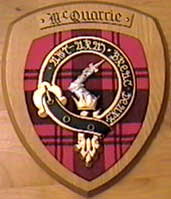 Gaelic Name: MacGuaidhre
Gaelic Name: MacGuaidhre
Motto: Turris fortis mihi deus
(God is a strong tower to me)
Badge: Pine
Lands: Ulva
Origin of Name: Gaelic, Son Guaire
(Proud or noble)
Pipe Music: The Red Tartaned Army
A branch of the great clan Alpine, the name MacQuarrie derives from the gaelic “guaire” meaning “noble”. According to tradition, Guaire was the brother of Fingon, the progenitor of the MacKinnon clan.
|
ROOTS OF THE MCQUARRIE FAMILY TREE
From "Genealogy of McQuarrie of McQuarrie taken from copy of Pedigree found in Douglas Baronage of Scotland"
|
 King Alpin (790-834)
King Alpin (790-834)
Lived to be 44 years of age.
Prince Gregory
Prince Gregory (McGorrie) "McGorrie" was derived from "Gregory" meaning "Noble."
Godfredus McGorrie
(1st generation of McGorries) Son of Prince Gregory.
Donald McGorrie
Died A.D. 1216. Married a Norwegian lady.
Cormac Mor McGorrie (died 1249)
When Alexander II invaded the Western Highlands in 1249 he was joined by Cormac Mor, chief of the Macquarries, but the Kings' death in Kerrera brought trouble to the clan.
Alan McGorrie (died 1263)
Married an Irish Lady. Fell at the Battle of Langs with Alex, III against Danes, 1263. Hector McGorrie, the second son of Cormac More McGorrie founded the House of McGuire in Ireland. He died in 1280.
 Hector McGorrie (died 1300)
Hector McGorrie (died 1300)
Son of Alan McGorrie and the "Irish Lady," married Finvola, daughter of Gillean, progenitor of the McLeans. He died in 1300. Fought with King Robert Bruce in the Battle of Bannockburn. (McGorrie now becomes McQuarrie.)
Gorrie or Godfrey McQuarrie (died 1340)
Married his cousin, More, or Marian, daughter of McGuire or Ireland.
John (Eoin) McQuarrie (died 1370)
Married Giles, daughter of McTorquel, descended from Norwegian Kings of Man by Torquel, grandson of King Olave. Gillespie, or Archibald, brother of John (Eoin) died young.
Lachlan Mores McQuarrie (died 1400)
Married Christian, daughter of John McGregor.
Hector McQuarrie (died 1430)
Married Margaret, daughter of Macneil of Sarry in the County of Inverness.
John McQuarrie (died 1473)
Married daughter of McGuire of Ireland, she died in 1460. The had 5 daughters. Colin McQuarrie, their son, is a famous historical character. He got the charter under the Great Seal. John McQuarrie of Ulva.
Dunslaff McQuarrie (1505)
Twenty years later John's son, Dunslaff, was chief of the clan. The clan lands were the island of Ulva and part of Mull, and after the forfeiture of the Lords of the Isles, the clan acquired independence like many other clans in the Western Isles. They then followed the MacLeans of Duart, and supported Donald Dubh Macdonald in his effort to restore the Lordship of the Isles. In 1505 the Macquarries, with their powerful leaders, the MacLeans of Duart, submitted to the government, and in 1517 Dunslaff Macquarrie was included in the petition of Laughlan MacLean of Duart for a free remission for all offences, which remission was granted by the Privy Council.
Donald McQuarrie (died 1520)
Married daughter of McDonald. His brothers were John and Fignon.
Hector McQuarrie (died 1560)
Married a daughter of the Macneils of Tynish, ancient family of Argylashire.
Donald McQuarrie (died 1580)
Married Christian, daughter of Lachlan MacLean, second son of Lachlan More Maclean of Dowart by Lady Margaret Cunningham, daughter of William, Sixth, Earl of Glencairn in Dumfrieshire.
Gillespie McQuarrie (1609)
Gillespie Macquarrie was one of the signatories to the Statutes of Iona in 1609. After the forfeiture of the Lord of the Isles. They followed Maclean of Durart. When, in 1609, the Bishop of the Isles went to Ione as commissioner for King James VI; among the chief men of the Isles who submitted themselves to him were McQuarrie of Ulva, Mackinnon of that III, and ten others.
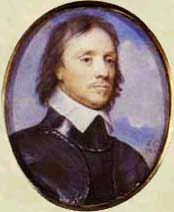 Alan McQuarrie (died 1651)
Alan McQuarrie (died 1651)
From the blow suffered in 1651, when the chief, Allan Macquarrie, and most of the clan were killed at the Battle of Iverkeithing, the Macquarries never recovered. Was a man of singular bravery and great loyalty. Slain with his cousin Sir Hector McLean of Dowart.
Lachlan McQuarrie (died 1700)
Married, first, Marian, daughter of Laird of Ardgour (Argyleshire). From the union of Lachlan and Marian came John and Julian. Second, Catherine, daughter of John Gamble MacLean of Coll, Argyleshire. From the union of Lachlan and Catherine came Allan, Flora, John, Donald, Alexander, and Don Andrim.
Donald McQuarrie
Married Margaret Maclean. Their children were Unna, Janet, Mary, Hector, John, Maria.
John McQuarrie
Married Flora MacLean.
Lachlan McQuarrie (died 1818)
 Married Alice, daughter of Donald Maclean of Torlisk. Second wife: Annie Macquarrie. This Lachlan was the proprietor of Ulva at the time of the visit of Dr. Johnson and Mr. Boswell to the island in 1773. Lachlan, 16th of Ulva, who had entertained Dr. Johnson and Boswell in 1773, was forced to sell his lands in 1778. Lachlan McQuarrie XVII of Ulva was obliged to dispose of his property, and in 1778, at the age of sixty-three, he entered the army.
Married Alice, daughter of Donald Maclean of Torlisk. Second wife: Annie Macquarrie. This Lachlan was the proprietor of Ulva at the time of the visit of Dr. Johnson and Mr. Boswell to the island in 1773. Lachlan, 16th of Ulva, who had entertained Dr. Johnson and Boswell in 1773, was forced to sell his lands in 1778. Lachlan McQuarrie XVII of Ulva was obliged to dispose of his property, and in 1778, at the age of sixty-three, he entered the army.
When the old 74th Regiment, or Argyll Highlanders, were raised in 1777 by Colonel Cambell of Barbreck, Lachlan MacQuarrie obtained a commission in it, and his name, under date 23 December, 1777, appears among the officers (Captain) of this regiment. He served with distinction until it was disbanded in 1783. After a long life, the last of the Macquarries of Ulva died in 1818 without male issue, so his line was extinct. The last chief of the Macquarries, He died in 1818, age 103, at Glenforsa, a valley in Mull.
|
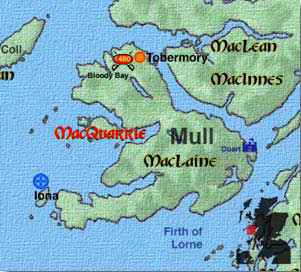
|
Major General Lachlan McQuarrie (1761-1824)
Major General Lachlan McQuarrie was Governor of New South Wales during the convict period, and under his wise government the colony prospered. He laid out the city of Sidney, and returned home in 1821, to the great regret of the colonists. His name is commemorated in MacQuarrie Island and other place-names.
Lockland McQuarrie grew up on the Isle of Ulva, joined the Black Watch of the Brittish Army in the latter part of the 18th Century. He served about sixteen years in India. He was in charge of some important military posts in Candad and the United States about the time of the American Revolution. In 1809 he was appointed Governor-General of Australia after the tyrannical Captain Bligh had been deposed. The Country was then known as New South Wales. It was sometimes called VanDeeman's land, because Prisoners from other parts of the British Empire were banished to this section. Many of the prisoners who were sent there were, of course, political offenders, - some were imprisoned because they were unable to pay their obligations and some for other such reasons which would not indicate that they were criminals. Under Bligh's terrorism, the people of the colony were depressed and demoralized; the population was largly convict and was exploited by hungry land-grabbers and by monopolists.
 Governor McQuarrie recognized that the prisoners were for the most [part men with great potential power, and that under proper conditions they might make just as good citizens and accomplish as much in the broad open country of Australia as the Scotch, Irish, and English pioneers had accomplished in other parts of the world. He therefore, permitted those who desired to build homes and become free land holders to take the amount of land that they could consistently work. Instead of using the money appropriated by the British Government to maintain these unfortunates in prison he used it to help finance them in subduing the soil. The population soared, extensive surveys were carried out and miles of roads built.
Governor McQuarrie recognized that the prisoners were for the most [part men with great potential power, and that under proper conditions they might make just as good citizens and accomplish as much in the broad open country of Australia as the Scotch, Irish, and English pioneers had accomplished in other parts of the world. He therefore, permitted those who desired to build homes and become free land holders to take the amount of land that they could consistently work. Instead of using the money appropriated by the British Government to maintain these unfortunates in prison he used it to help finance them in subduing the soil. The population soared, extensive surveys were carried out and miles of roads built.
The laws or rules passed to enable him to make this change are known as the "Prison Reform Laws". It would be hard to estimate the amount of good which was accomplished both in the creating of property and the building of character as the result of this then untried policy which the Governor introduced. The success which attended his efforts has done much to modify and improve the treatment of prisoners in other parts of the British Empire, and has no doubt had a more far reaching effect. Gradually, however, McQuarries ill health made him an easy target for the monopolists who practically forced his return to London where he died. Affectionately known as the "Father of Australia" his name is perpetuated in the Lachlan and MacQuarrie rivers, and in the MacQuarrie island.
On one of the public squares in Sydney, Australia, there is a large stone chair which was carved out of a single stone by some of theses prisoners. It is known as "Lady McQuarrie's Chair", and it was set up in honor of the wife of the Governor.
|
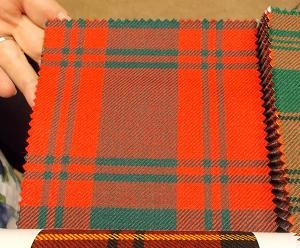 |
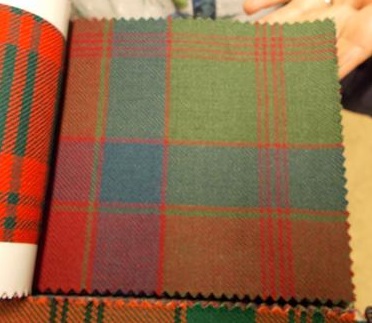
|
|
|

 Gaelic Name: MacGuaidhre
Gaelic Name: MacGuaidhre
 King Alpin (790-834)
King Alpin (790-834) Hector McGorrie (died 1300)
Hector McGorrie (died 1300) Alan McQuarrie (died 1651)
Alan McQuarrie (died 1651) Married Alice, daughter of Donald Maclean of Torlisk. Second wife: Annie Macquarrie. This Lachlan was the proprietor of Ulva at the time of the visit of Dr. Johnson and Mr. Boswell to the island in 1773. Lachlan, 16th of Ulva, who had entertained Dr. Johnson and Boswell in 1773, was forced to sell his lands in 1778. Lachlan McQuarrie XVII of Ulva was obliged to dispose of his property, and in 1778, at the age of sixty-three, he entered the army.
Married Alice, daughter of Donald Maclean of Torlisk. Second wife: Annie Macquarrie. This Lachlan was the proprietor of Ulva at the time of the visit of Dr. Johnson and Mr. Boswell to the island in 1773. Lachlan, 16th of Ulva, who had entertained Dr. Johnson and Boswell in 1773, was forced to sell his lands in 1778. Lachlan McQuarrie XVII of Ulva was obliged to dispose of his property, and in 1778, at the age of sixty-three, he entered the army.
 Governor McQuarrie recognized that the prisoners were for the most [part men with great potential power, and that under proper conditions they might make just as good citizens and accomplish as much in the broad open country of Australia as the Scotch, Irish, and English pioneers had accomplished in other parts of the world. He therefore, permitted those who desired to build homes and become free land holders to take the amount of land that they could consistently work. Instead of using the money appropriated by the British Government to maintain these unfortunates in prison he used it to help finance them in subduing the soil. The population soared, extensive surveys were carried out and miles of roads built.
Governor McQuarrie recognized that the prisoners were for the most [part men with great potential power, and that under proper conditions they might make just as good citizens and accomplish as much in the broad open country of Australia as the Scotch, Irish, and English pioneers had accomplished in other parts of the world. He therefore, permitted those who desired to build homes and become free land holders to take the amount of land that they could consistently work. Instead of using the money appropriated by the British Government to maintain these unfortunates in prison he used it to help finance them in subduing the soil. The population soared, extensive surveys were carried out and miles of roads built.
